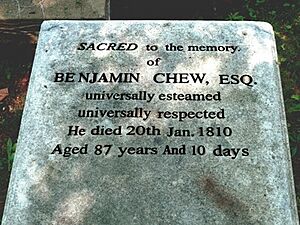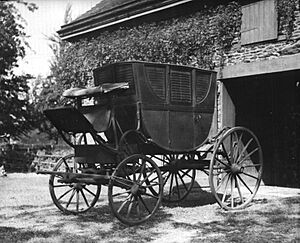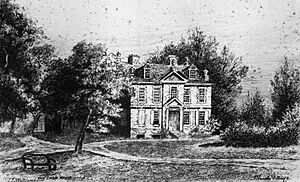Benjamin Chew facts for kids
Quick facts for kids
Benjamin Chew
|
|
|---|---|
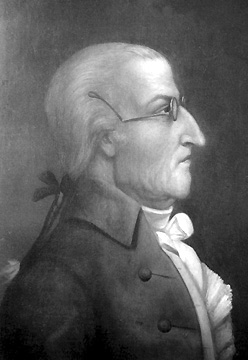
An illustration of Chew, c. 1890
|
|
| Judge and President of the Pennsylvania High Court of Errors and Appeals | |
| In office 1791 – 1808 |
|
| Chief Justice of the Supreme Court of Pennsylvania | |
| In office 1774 – 1777 |
|
| Register-General of Wills of Pennsylvania | |
| In office 1765 – 1777 |
|
| Master of Rolls of Pennsylvania | |
| In office 1755 – 1774 |
|
| Recorder of Philadelphia | |
| In office 1755–1774 |
|
| Attorney General of Pennsylvania | |
| In office 1754–1769 |
|
| Speaker of the Lower House for the Delaware counties | |
| In office 1753–1758 |
|
| Personal details | |
| Born | November 19, 1722 Anne Arundel County, Maryland Colony, British America |
| Died | January 20, 1810 (aged 87) Cliveden, Germantown, Pennsylvania, U.S. |
| Spouse | Elizabeth Oswald |
| Children | 11, including Peggy |
| Alma mater | Middle Temple |
| Occupation | Lawyer, Judge, Chief Justice, High Court President |
| Signature |  |
Benjamin Chew (born November 19, 1722 – died January 20, 1810) was an important American lawyer and judge. He served as the top judge (Chief Justice) for Pennsylvania's highest court. Chew was known for his clear and brief legal arguments. He also had an excellent memory and deep knowledge of the law. He believed strongly in the power of law and the constitution.
Benjamin Chew was trained in law from a young age by Andrew Hamilton. He took over Hamilton's clients, including the family of William Penn, who founded Pennsylvania. Chew represented the Penn family for sixty years. He also owned enslaved people.
Chew was a lifelong friend of George Washington. Washington was said to treat Chew's children like his own. Chew lived and worked in Philadelphia, near what is now Independence Hall. He gave free legal advice to America's Founding Fathers. This happened while they were creating the United States Constitution and the Bill of Rights.
Contents
Early Life and Learning
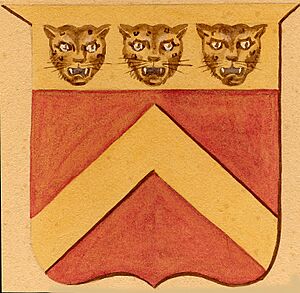
Benjamin Chew was born in Anne Arundel County, Maryland. His father, Samuel Chew, was a doctor and the first Chief Justice of Delaware Colony. Benjamin's family had been in America since 1622.
Young Benjamin became interested in law early on. In 1736, at age 15, he started studying law. He worked in the Philadelphia offices of Andrew Hamilton. Hamilton was a famous lawyer who had won a big case for publisher John Peter Zenger. This case helped establish the idea that telling the truth is a defense against libel (false statements).
Hamilton's ideas about a free press greatly influenced Chew. Chew also studied English legal history. This helped him believe strongly in civil liberties, like the right to free speech. These rights are now in the U.S. Constitution's First Amendment.
After Hamilton died in 1741, Chew went to London to study law. He attended the Middle Temple, one of the top law schools. He returned to Pennsylvania in 1744 and began practicing law in Dover, Delaware.
Chew grew up in a Quaker family. However, he broke with Quaker traditions. In 1741, he agreed with his father that it was lawful to resist an armed force. In 1747, at age 25, he took the Oath of Attorney in Pennsylvania. This was also against Quaker tradition.
A Career in Law
Philadelphia Lawyer
In 1754, Chew moved to Philadelphia. He continued his legal work in both Delaware and Pennsylvania. After some early government jobs, he started his own law practice in 1757. He also joined the Anglican Church that year.
Chew was very good at defending civil liberties. He also helped settle land disputes. He represented the descendants of William Penn, who owned vast lands in Pennsylvania. This work lasted for over 60 years.
Most of Chew's money came from his law practice. He also managed his second wife's large estate. He continued his family's tradition of investing in land. He bought properties in Pennsylvania, Maryland, Delaware, and New Jersey.
In his early career, Chew met with other young Philadelphia men. In 1766, they formed the Gloucester Fox Hunting Club. This was the first such club in the United States. It showed how they adopted English gentlemanly customs.
Chew held many important government jobs:
- Speaker of the Lower House for the Delaware counties (1753–1758)
- Attorney General of Pennsylvania (1754–1769)
- Recorder of Philadelphia City (1755–1774)
- Master of Rolls (1755–1774)
- Provincial Councillor of Pennsylvania (1755)
He also became a trustee of the University of Pennsylvania in 1757. He taught many law students, including Edward and William Tilghman. Both of these students were later offered the job of State Chief Justice.
In 1774, Chew became the Chief Justice of the Supreme Court of Pennsylvania. During the American Revolutionary War, the new state government removed him from office in 1777. He was held in New Jersey until the British left Philadelphia.
After the war, Chew returned to a position of power. In 1791, he became a judge and president of the Pennsylvania High Court of Errors and Appeals. This was the highest court in Pennsylvania. He held this job until he retired in 1808.
Mason–Dixon Line
When he was 29, Chew held several important jobs. In 1750, he was named Secretary of the Boundary Commission. He successfully represented the Penn family for 18 years. This was during their land dispute with the Calvert family of Maryland.
The dispute was finally settled in 1768. The Boundary Commission oversaw the creation of the Mason–Dixon line. This line became the border between Pennsylvania and Maryland.
Albany Conference
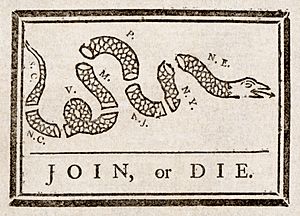
On June 19, 1754, the Albany Congress took place in Albany, New York. Representatives from seven colonies attended. Benjamin Chew was there as a secretary for the Pennsylvania group.
These secretaries helped create a plan to unite the colonies. This was important because France posed a threat during the Seven Years' War (also called the French and Indian War). The Albany Plan of Union was one of the first ideas to bring the British colonies together. Benjamin Franklin proposed the plan. Six months later, Chew, then 32, became Attorney General of Pennsylvania.
Easton Conference
In October 1758, the Easton Conference was held in Easton, Pennsylvania. Its goal was to fix problems caused by the Walking Purchase of 1737. This purchase had hurt relationships between Native Americans and the colonists.
As Attorney General, Chew attended the talks for the Treaty of Easton. He wrote down what happened in his "Journal of a Journey to Easton." The conference ended on October 26. A general peace was announced soon after.
Attorney General and Chief Justice
From 1755 to 1769, Chew served as Attorney General of Pennsylvania. He also worked as the Recorder of Philadelphia. He gained a very strong reputation.
When the Stamp Act was being considered, Chew warned the British Crown. He said that Americans were "irritated and turbulent." The Stamp Act was repealed two months later.
Chew supported the colony's interests and opposed British abuses. However, he did not support independence from Britain. He believed that protest and reform were the way to solve problems. He was a pacifist, meaning he did not believe in using force.
Despite his views, Chew was removed from office in 1777. He was held in New Jersey as a suspected Loyalist. He refused to take the arrest seriously at first. He argued that it violated his rights as a free man. He believed it was his duty to oppose it.
President of the High Court
After the Revolutionary War, Chew was appointed to a new important role. In 1791, Thomas Mifflin, Pennsylvania's first Governor, made Chew President of the Pennsylvania High Court of Errors and Appeals. This was the highest court for appeals in the state. Chew held this position until he retired in 1808.
Political Views
Before the American Revolution, Chew was friends with George Washington and John Adams. He strongly supported the colonies. As a lifelong pacifist, he believed in peaceful protest and reform. He did not support an active revolution. He kept this view even after leaving the Quakers and joining the Anglican Church in 1758.
Both the British and the colonists wanted Chew's support. He held many important roles in the colony. Chew was unsure about the right path. He once said that using force against the king was "high treason." But he also said that if the king went beyond his power, then obeying him would be "treason."
On August 4, 1777, the British army was nearing Philadelphia. The new government ordered Chew's arrest for public safety. Chew demanded to know why he was being charged. He felt his rights were being violated.
The government decided to let Chew and Governor John Penn stay at Chew's wife's house in New Jersey. Six months later, after the British left, both men returned to Philadelphia.
After the Revolution, Chew remained influential. He continued to meet with people of different faiths and political views. He was part of the Tammany Society, which honored Tamanend, a Lenni-Lenape chief. Chew's legal skills were very helpful to the new government.
Chew's Homes
Third Street House
In 1771, Chew bought a house on South Third Street in Philadelphia. It used to belong to his client, Governor John Penn. For almost 50 years, Benjamin and Elizabeth Chew lived there with their many children. Their home was a center of social and cultural life in the nation's first capital.
The Chews hosted many important guests. These included Governor John Penn, Thomas Mifflin, and Brigadier General Henry Bouquet. Abigail Adams called Chew's daughters a "constellation of beauties" in Philadelphia.
Margaret Chew married Maryland Governor John Eager Howard in 1787. Sophia was invited to Martha Washington's first public event in Philadelphia. Harriet entertained George Washington while his portrait was being painted. She later married the son of Charles Carroll of Carrollton, a signer of the Declaration of Independence. George Washington helped transfer letters between Mr. and Mrs. Chew during the war.
The Chew family's Third Street house was next to the home of Samuel Powel, Philadelphia's mayor. His wife, Elizabeth Willing Powel, was a close friend of George Washington. After their parents died, three of Chew's daughters moved out. The house was sold in 1828 and torn down in 1830.
Cliveden Estate
To protect his family from diseases in Philadelphia, Chew built a summer home in Germantown. He called it Cliveden, also known as the Chew house.
On August 4, 1777, Chew's family left Cliveden and returned to their Third Street home. The British Commander-in-Chief, General Howe, quickly took over the empty house. Its strong walls helped him win the Battle of Germantown on October 4.
After Chew was released in May 1778, he moved his family to their estate in Delaware. He sold Cliveden because it needed too many repairs after the battle. While in Delaware, the Chews rented their Third Street house to important figures. These included the Spanish representative and the French liaison officer. George and Martha Washington also rented it from 1781 to 1782.
By 1783, the Chews felt it was safe to return to Philadelphia. They lived full-time on South Third Street during the formation of the United States. This included the Constitutional Convention and the adoption of the Bill of Rights.
In 1797, Chew bought Cliveden back. It stayed in the family for five more generations. Cannonballs from the Battle of Germantown were in its walls until 1972. That year, Chew's descendants gave the house to the National Trust for Historic Preservation. Most of the cannonballs were removed during restoration.
Family Life
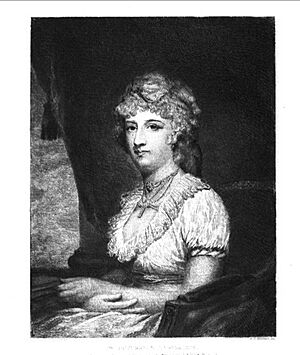
Chew married his first cousin, Mary Galloway, on June 13, 1747. They had five daughters before Mary passed away. From 1754 to 1771, the Chews lived on Front Street in Philadelphia.
He married again on September 12, 1757, to Elizabeth Oswald. Elizabeth was the niece and heir of Captain Joseph Turner. Benjamin and Elizabeth had seven more daughters and two sons.
In 1758, Chew permanently left the Quakers and joined the Church of England. He and his wife had their son Benjamin baptized at Christ Church. They later worshipped at St. Peter's Church in Germantown. This was part of a process of becoming more like English gentlemen.
Chew became much wealthier when he married Elizabeth Oswald. They owned many slaves to work on their properties. In 1760, Richard Allen was born into slavery on the Chew's "Whitehall" property in Delaware. In 1768, Chew sold eight-year-old Richard and his family to Stokley Sturgis. Sturgis was a known abolitionist and neighbor. Richard Allen later became a preacher and founded the African Methodist Episcopal Church. This was the first African American church denomination in the United States.
Death
After a long illness, Benjamin Chew died at Cliveden on January 20, 1810. He is buried at St. Peter's Churchyard in Philadelphia.
Legacy
- In 1906, a portrait of Benjamin Chew was placed in the Pennsylvania State Capitol building in Harrisburg. This honored his role as Chief Justice.
- Chew Avenue in Philadelphia is named after him.
- Chew Street in Allentown, Pennsylvania is named after him.
- In 1942, a Liberty ship called the Benjamin Chew was built in his honor.
- Chewton, Pennsylvania in Lawrence County was named after Benjamin Chew. He owned over 30,000 acres of land in Western Pennsylvania.
See also
- Reverend Richard Allen, the founder and first Bishop of the African Methodist Episcopal Church, was a former slave whose parents were enslaved by Chew. In 1768, Chew sold Richard Allen, along with all members of his family, to his friend and neighbor Stokeley Sturgis.
 | Stephanie Wilson |
 | Charles Bolden |
 | Ronald McNair |
 | Frederick D. Gregory |


